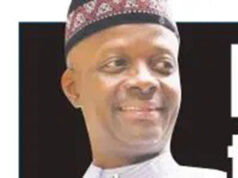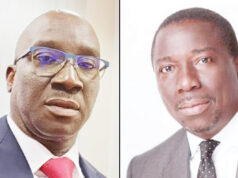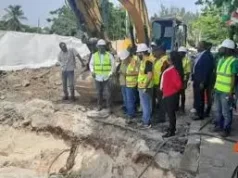 The Presidential Task Force on COVID-19 has said the Federal Ministry of Health has shortlisted for further investigations, three Nigerian drugs, which have the potential to cure COVID-19 or treat its symptoms.
The Presidential Task Force on COVID-19 has said the Federal Ministry of Health has shortlisted for further investigations, three Nigerian drugs, which have the potential to cure COVID-19 or treat its symptoms.
The Chairman of the Presidential Task Force on COVID-19 and Secretary to the Government of the Federation, Mr Boss Mustapha, disclosed this on Wednesday at the PTF press conference in Abuja, where the ministry of health warned that Nigeria’s health system could not cope with increasing COVID-19 cases.
But Mustapha said three shortlisted drugs would be subjected to further investigations by relevant health agencies.
The PUNCH had on Tuesday exclusively reported that the Federal Ministry of Health was screening 19 local firms for production of herbal drugs that could possibly treat or cure COVID-19.
The Minister of State for Health, Senator Olorunnimbe Mamora, who confirmed the screening to The PUNCH, said the companies had been asked to submit samples of their drugs.
At the PTF press briefing on Wednesday, Mustapha disclosed that the Federal Ministry of Health had held a virtual meeting with some researchers and scientists who had made claims about COVID-19 cure and shortlisted three for further research.
He stated, “As a measure of the importance attached to research and development of local capacity for finding a cure to the COVID-19, the Federal Ministry of Health held a virtual meeting with a number of researchers and scientists with claims to cure for COVID 19 and out of the numerous claimants, three were found to deserve further investigation and have been forwarded to the relevant authorities for appropriate review.
“Similarly, efforts are being made by the Federal Ministry of Science and Technology to subject some locally manufactured COVID-19 equipment to verification and subsequent certification.”
The task force also backed the decision of the World Health Organisation to suspend clinical trials of hydroxychloroquine for the treatment of the novel coronavirus.
The PTF Chairman, Mustapha, therefore cautioned the National Agency for Food and Drug Administration and Control and other relevant agencies to ensure that all claims to treatment by scientists and researchers were subjected to scientific certification protocols.
The WHO had on Monday suspended the hydroxychloroquine trials because of the high mortalities among patients the drug was administered on.
On Tuesday, NAFDAC Director General, Prof Mojisola Adeyeye, said the agency would go ahead with the trial on the grounds that it had been effective in the treatment of COVID- 19 patients, especially those at the mild stage of the virus.
But Boss Mustapha urged NAFDAC to subject all claims to scientific investigations.
He said, “In our briefing of Thursday May 21, the PTF categorically advised Nigerians against self-medication in treating COVID -19. Particularly, the use of hydroxychloroquine, was discouraged because it had not been certified for use in treating COVID-19.
“We have read in the media about the side effects of the use of this drug from COVID-19 patients that survived as well as those who took it outside clinical supervision.
“The World Health Organisation has temporarily suspended all clinical trials of hydroxychloroquine as a potential treatment for COVID-19. This advice was informed by a study which identified that the use of hydroxychloroquine, either alone or with other drugs, has been responsible for a high number of deaths.
“This precautionary measure by the WHO underscores the importance of not only seeking expert medical advice but also ensuring that all claims to treatment by scientists and researchers, whether conventional or traditional, should be subjected to scientific certification protocols by NAFDAC and other relevant institutions so as to guarantee the efficacy of the discovery.”
The PTF also said a protocol had been developed to give community members greater involvement and ownership in identifying and supporting the case management process.
Mustapha said the details would be unfolded in the coming days.
The SGF said allowances of security agents and frontline medical workers would be paid as soon as the National Assembly approved the 2020 Budget Appropriation (Amendment) Bill.
He said, “You are aware that the National Assembly is cutting short its recess to reconvene tomorrow to consider the adjustment to the 2020 budget. You don’t begin to apply certain amount of money…you wait for approvals.
“I believe by the time the leadership of the National Assembly considers the adjustment which has become of necessity because of the economic impact of COVID-19, I can assure everybody will be paid the stipends they are entitled to.”
Responding to a question, the SGF said on March 11, the Minister of Agriculture presented a memo of N13.9 bn to the Federal Executive Council for monitoring and surveillance, and control of trans-boundary movement of animals pests and diseases, and rehabilitation of major abattoirs.
He said, “It is very true, we are expecting an invasion of locust, particularly, in the northern part of the country.”
COVID-19: FG suspends evacuation of stranded Nigerians
Meanwhile, the Federal Government has suspended further evacuation of Nigerians stranded abroad pending when a new protocol already designed for that purpose will start.
The Minister of Foreign Affairs, Geoffrey Onyeama, announced this during at the task force press conference.
Onyeama said the new arrangement would require citizens returning from overseas to be tested before their flights back home.
The minister said, “Now, there is going to be a change in that protocol and that is going to affect the timing of any further evacuation that we are going to undertake.
“So, anybody that is going to be evacuated will, first of all, undergo a test from the country they are leaving from, at least five days before travel and not later than nine days before travel.
“That would be a pre-condition for boarding a flight to Nigeria; so a pre-flight test and if it’s positive, of course, they would not be able to get on the flight; if they are negative, they can get on the flight.”
Onyeama said after the tests abroad, those who tested positive would be required to stay back for treatment, noting that only individuals who returned negative would be allowed to board the flight.
According to him, the samples of the returnees would be taken on arrival in the country and their passports confiscated, adding that they would go on self-isolation in their homes.
The development is a departure from the previous arrangement where evacuees were quarantined in hotels for 14 days.
At least, 1,000 individuals evacuated from the United Kingdom, the United States, the United Arab Emirates, Saudi Arabia and lately, Lebanon have been quarantined in hotels in Lagos and Abuja. Three returnees from the UAE returned positive.
Onyeama also disclosed that billionaire businessman, Aliko Dangote and other private sector players had set up testing units which would take samples from passengers coming off the plane, adding that the results would be available within two days.
He said anyone who tested negative would still be required to spend more days to complete the 14-day isolation period after which they could collect their passports.
On the number of positive tests among returnees, Onyeama disclosed that only the three cases reported in respect of the UAE returnees in Lagos were positive.
21 states have fewer than 100 beds each
At the press briefing, the minister of state for health said that 21 states had fewer than 100 bed spaces each for the treatment of COVID-19 patients.
He added that only five states and the Federal Capital Territory, Abuja, had at least the prescribed 300 beds.
Nigeria has 112 treatment, isolation centres
The minister also stated the country had 112 treatment and isolation centres in the 36 states and the FCT with a total of 5,324 beds.
Increasing cases could exceed govt’s capacity to cope – Health minister
The minister said, “Though not surprising, we are concerned about the increasing number of confirmed cases. This is because very high cases could seriously exceed the capacity of our health system to cope. Routine cases may also suffer as a result. Therefore, non-pharmaceutical preventive approach is still our best strategy.
“At present, we have a total of 112 treatment and isolation centres in all the 36 states and the FCT with 5,324 beds. While only five states including the FCT have at least 300 beds as prescribed for isolation and treatment, 21 states have less than 100 bed spaces.
Govt asks philanthropists to set up treatment centres
“As the number of confirmed cases increases, there is an urgent need to expand our treatment centres across the country. I therefore call on the state governors and philanthropists to take active and deliberate steps to scale up the number of beds for isolation and treatment of confirmed cases in their states.”
The health minister said the Nigerian medical researchers working with foreign partners had been able to ascertain that the strain of COVID-19 in Nigeria was the same in Wuhan, China, where the virus first broke out.
Govt can’t risk reopening schools now, says education minister
Meanwhile, the Minister of State for Education, Emeka Nwajiuba, said that the Federal Ministry of Education would not risk reopening schools across the country, until all preventive measures had been put in place.
He noted that various dates of resumption being circulated in some quarters were false, adding that the government would consider introducing afternoon classes to ease rowdiness.
Nwajiuba said, “We want to say that the announcement that we are reopening all schools on June 8 did not emanate from us. That is not true; until we are sure that these children can go to school, return safely and not bring home with them this COVID-19 material.
“So we are not taking that risk yet. We are going to prepare as much as possible within the guidance that we are offered, working in conjunction with the World Health Organisation, before we reopen schools.”
The Director General of the Nigeria Centre for Disease Control, Dr Chikwe Ihekweazu, said new studies showed that the novel coronavirus had a viability period of a maximum of 10 days.
Ihekweazu stated, “One of the merits over the last few days is (that) detection of fragments of this virus, over time, doesn’t in itself mean that there is an active virus, over time.
“Studies have now shown, using this PCR test, in addition to something we call ‘viral culture,’ day to day, that the longest viability period of the virus is about 10 days, maximum.”
He said, in some of the “celebrated” COVID-19 cases, the Federal Government could not discharge those patients at the time because they did not know how long the virus remain viable.
On the situation in Kogi State, the NCDC DG said the centre would provide support to states that sought it.
He said, “We are focused on supporting all the states in the country and our focus will continue to be states requesting and the people living in those states.
“Almost every day, I get calls from governors pushing for labs, treatment centres, commodities, IPC (infection prevention and control), technical support, guidance (and) knowledge.”
While fielding questions, he spoke on the isolation and discharge of recent evacuees to Nigeria, saying none of the United Kingdom evacuees isolated in Abuja, who returned on May 8, was positive.
Three out of the 256 Nigerians evacuated from Dubai on May 7 had tested positive for COVID-19 in Lagos.
But Ihekweazu said, “We had only three positives from that first flight that came through Lagos. All the ones that were tested in Abuja over the last few days have been negative and discharged home to rejoin their families.”
According to him, the Federal Government has procured reagents that are sufficient to test more than 100,000 persons.
He said, “We have reagents in our stockpile to test over 100,000 people. So, the challenge now is not reagent. The challenge is really to work with states to reinvigorate the sample collection process.”
When asked to provide updates on the situation in Bonny Island, Rivers States, where at least 11 reportedly died in strange circumstances, Ihekweazu stated that a team had been deployed to collect samples for testing.
The NCDC boss stated that costs per test were sometimes not as simple as one would think, adding it depended on what one included in the cost.
The Lagos State Government, last Thursday, said it had conducted 16,000 COVID-19 tests at the average cost of between N40,000 and N50,000, adding that it had spent about N800m on testing alone
Source: Punch







